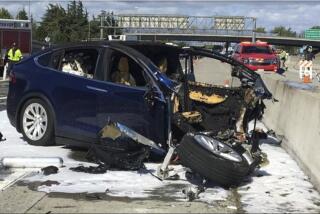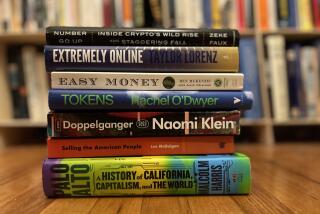The Cutting Edge: Computing / Technology / Innovation : A Digital Visionary Scans the Info Horizon
- Share via
Name: Jonathan Seybold Age: 51 Education: Bachelor’s from Oberlin College; graduate work in economics at Yale University Title: Founder of Seybold Seminars, publisher of the Seybold Reports Family: Seybold and his wife, Patricia, were high school sweethearts. They have two daughters. Interests: Ocean kayaking, hiking, telecommuting from his homes in Malibu and Santa Fe, N.M. Hardware: Two Macintosh Centras (610 and 650), two CD-ROM drives, one Macintosh PowerBook, one IBM-compatible 486, three cellular phones, three digital answering machines, two surround-sound theater set-ups with laser disc players.
*
Jonathan Seybold organized the first Digital World conference four years ago, in the dark ages when superhighways were still for cars. Back then, Seybold’s vision of converging industries and digital revolution sounded far-fetched to many of the computing, cable, telecommunications, publishing and entertainment executives for whom he consulted.
Things have changed. This year, any conference with “digital” in its title--and there were way too many of them--drew crowds of true believers. Amid the hype, Digital World has retained more credibility than the rest. The conference, which runs next Monday through Wednesday, moves from the Beverly Hills Hilton to the Los Angeles Convention Center this year. It will include for the first time a media festival showcasing the 27 best applications of interactive technology as selected by a panel of inter-industry judges.
Ziff Davis acquired Seybold’s company in 1990 and last year closed its Malibu operations in a consolidation move. Seybold says the change has freed him of management duties, allowing him to spend his time on research, consulting and networking. We caught up with him in Malibu, where he maintains a virtual office.
*
Q: Over the last year we’ve seen this frenzy of alliance making and merger announcements, only to watch a lot of them fall apart. At the same time, a bunch of the high-profile new-media stocks have collapsed. Has the digital revolution lost momentum?
A: No. It was entirely predictable. This may even happen a second time. People habitually overestimate the speed with which something happens in the short run and underestimate the impact in the long run. And then reality sets in and people say: “Hey, this is going to be hard. This is going to take a long time.” And you know revolutions--people get hurt in revolutions. So things come back down to earth. But in the meantime, we have quadrupled the number of home computers equipped with CD-ROM drives this past year. There is for the first time a real market for interactive CD-ROMs. The Internet is gaining a million users a month. So in the midst of all that hype there was actually a lot happening.
*
Q: What advice can you give people who are trying to separate the hype from the reality?
A: The first bit of advice is to think of this as something that’s going to take a couple of decades to play out. Take a deep breath and look at it in that perspective. The second thing you have to do is acknowledge the fact that business has probably irrevocably changed and that alliances and relationships are going to be a permanent fact of business from now on. The third thing I would say is that we are in the period of the fighting for who gets to have the power positions and who gets to set the standards. That is going to be a brutal, very rough fight. There’s a huge amount of jockeying that’s going on with the phone companies and the cable companies, and what is going to happen out of that will set the rules by which the infrastructure gets developed. And there’s nothing inevitable about these arrangements. There’s no technological deus ex machina .
*
Q: So if you had to guess, who’s going to win?
A: Right now it looks as if the phone companies are in by far the stronger position and the cable industry is in a much weaker position. But that’s only happened since October. That’s how fast these things change. And I don’t think anyone’s willing to bet that we’ve seen the last, you know, the last shift in this stuff.
*
Q: What is the biggest obstacle left to rolling out the information superhighway?
A: There are two of them. The first one is working out the legal and regulatory framework. No one knows what rules we’ll be playing by and therefore exactly how they can or can’t make the investment. The second issue is that the pipelines are only just that--they’re pipelines. They don’t do anything. What does something is what you do with them in terms of building the computer servers and connecting into them the home computers and the television set-top boxes and so forth. And what we’re talking about there is developing and installing computer systems which are thousands of times more powerful than those which we’ve installed in offices. And putting a significant portion of our population on line to these computer systems--people who can’t program their VCR. This is a huge technical challenge.
*
Q: When will average Americans see concrete evidence of the info highway in their own lives?
A: Some Americans are already seeing it. I’m amazed at the number of people who are going onto on-line computer services, considering that most of these are at best user-hostile. And the Internet is defiantly user-hostile. There’s not going to be a big bang. It’s going to start nibbling around the edges of peoples’ lives. People will start giving you their business cards with their e-mail address on it. There’ll be a lot of experimentation. But as for when the average consumer in Westwood or Van Nuys is going to get video on demand, it’s going to be awhile. The best case I see is that it’s going to be into the next decade before we pass, in most service areas, a point at which more than half the people have access to broad-band services. But of course you don’t need the whole population on line to have a real market.
*
Q: What do you picture when you think of a “digital world”?
A: It’s a world in which we have separated the content from the carrier. Everything is digital. Everything can be mixed. Everything can be transmitted. Everything can be interacted with. We’re taught to value something because of the physical embodiment of it. We’re taught to think of a book or a movie we rent as the cassette tape that we take from the video rental place--as though that is what has value. But in reality it isn’t what has value at all. What has value is the intangible data that’s on that tape or embodied in that book. It doesn’t matter whether it comes to you on tape or a card or a piece of paper. It’s a fundamental shifting of thinking.






